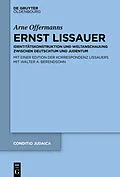Ernst Lissauer (18821937), Autor des berüchtigten Haßgesangs gegen England, gehört zu den stark assimilierten deutschen Juden', die unter dem Antisemitismus mehr als Deutsche denn als Juden litten. Lissauer empfand sich zeitlebens ausschließlich als deutsch', trat jedoch für ein Deutschtum' ein, das auf Kultur, Geschichte und Territorium statt Rasse' beruhte. Seine Wertvorstellungen und Ideale weisen gleichwohl große Nähe zu denen deutsch-völkischer Kreise auf. Die religiösen Vorstellungen des Dichters waren geprägt von den Ideen Arthur Bonus', der eine Germanisierung des Christentums propagierte.Die Studie erschließt seine Weltanschauung und Identitätskonstruktion, die Position Lissauers zwischen Deutschtum' und Judentum' sowie Grundtendenzen des Werks, das im Umfeld der Neuromantik und des frühen Expressionismus zu verorten ist. Dazu dient auch die kommentierte Edition des Briefwechsels mit Walter A. Berendsohn, dem Nestor der deutschen Exilliteraturforschung, aus den Jahren 19351937.
Autorentext
Arne Offermanns, Universität Hamburg
Klappentext
Ernst Lissauer (1882-1937), Autor des berüchtigten "Haßgesangs gegen England", gehört zu den stark assimilierten deutschen ,Juden', die unter dem Antisemitismus mehr als Deutsche denn als Juden litten. Lissauer empfand sich zeitlebens ausschließlich als ,deutsch', trat jedoch für ein ,Deutschtum' ein, das auf Kultur, Geschichte und Territorium statt ,Rasse' beruhte. Seine Wertvorstellungen und Ideale weisen gleichwohl große Nähe zu denen deutsch-völkischer Kreise auf. Die religiösen Vorstellungen des Dichters waren geprägt von den Ideen Arthur Bonus', der eine "Germanisierung des Christentums" propagierte.Die Studie erschließt seine Weltanschauung und Identitätskonstruktion, die Position Lissauers zwischen ,Deutschtum' und ,Judentum' sowie Grundtendenzen des Werks, das im Umfeld der Neuromantik und des frühen Expressionismus zu verorten ist. Dazu dient auch die kommentierte Edition des Briefwechsels mit Walter A. Berendsohn, dem "Nestor" der deutschen Exilliteraturforschung, aus den Jahren 1935-1937.
Zusammenfassung
This book-series, initiated in 1992, has an interdisciplinary orientation; it is published in English and German and comprises research monographs, collections of essays and editions of source texts dealing with German-Jewish literary and cultural history, in particular from the period covering the 18th to 20th centuries.
The closer definition of the term German-Jewish applied to literature and culture is an integral part of its historical development. Primarily, the decisive factor is that from the middle of the 18th century German gradually became the language of choice for Jews, and Jewish authors started writing in German, rather than Yiddish or Hebrew, even when they were articulating Jewish themes. This process is directly connected an historical change in mentality and social factors which led to a gradual opening towards a non-Jewish environment, which in its turn was becoming more open. In the Enlightenment, German society becomes the standard of reference initially for an intellectual elite. Against this background, the term German-Jewish literature refers to the literary work of Jewish authors writing in German to the extent that explicit or implicit Jewish themes, motifs, modes of thought or models can be identified in them.
From the beginning of the 19th century at the latest, however, the image of Jews in the work of non-Jewish writers, determined mainly by anti-Semitism, becomes a factor in German-Jewish literature. There is a tension between Jewish writers' authentic reference to Jewish traditions or existence and the anti-Semitic marking and discrimination against everything Jewish which determines the overall development of the history of German-Jewish literature and culture. This series provides an appropriate forum for research into the whole problematic area.
